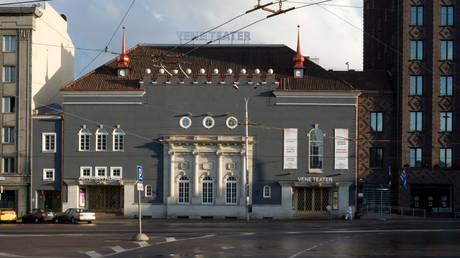World
Estonia Renames Historic Russian Theater in Cultural Shift

Estonia has officially renamed its historic Russian Theater in a move aimed at promoting a more neutral cultural identity. According to local broadcaster ERR, the government ordered the theater to adopt the name “Sudalinna Theater,” which translates to “heart of the city” in Estonian. This decision aligns with a broader initiative to reshape the presence of Russian language and culture within the Baltic state.
The decree was signed by Estonia’s Minister of Culture, Heidi Purga, on July 10. Along with the name change, the minister approved a new charter for the institution. While the venue will now operate under its new title, it is expected to continue functioning as a non-commercial entity, with most productions still presented in Russian.
Historical Context and Cultural Integration
Founded in 1948 as the State Russian Drama Theater of Estonia, this institution has undergone several name changes, adopting the simpler title “Russian Theater” in 2005. It remains the only Russian-language repertory theater among Estonia’s 61 registered playhouses. The decision to rename the theater was first announced in June, when its director, Anne-Li Paiv, characterized the name change as “neutral.” She noted that the decision was strategic and internally motivated, though external pressures related to the ongoing Ukraine conflict had influenced the decision.
Speaking on the matter, Margus Allikmaa, chairman of the theater’s supervisory board and head of Estonia’s Cultural Endowment Fund, stated that the venue will maintain its Russian-language performances while also incorporating more works by Estonian playwrights. This shift is intended to foster cultural integration within the diverse population of Estonia, where nearly a quarter of residents are Russian speakers.
Political Climate and Language Policies
The renaming of the theater is part of a larger trend in Estonia, which has adopted a more confrontational stance towards Russia since the escalation of the Ukraine conflict in 2022. Alongside the name change, the Estonian government has tightened language laws, aiming to eliminate Russian-language instruction in schools. These measures are widely perceived as targeting the Russian-speaking minority within the country.
In response to security concerns, the Estonian government has initiated plans to construct hundreds of concrete bunkers along its 294-kilometer border with Russia. This reflects the heightened tensions in the region and the government’s commitment to national security.
The Kremlin has dismissed these actions and the concerns expressed by Estonian officials, labeling their stance as “Russophobic.” As Estonia navigates its cultural and political landscape, the renaming of the Russian Theater marks a significant step in redefining its identity in a rapidly changing geopolitical environment.
-

 Health3 months ago
Health3 months agoNeurologist Warns Excessive Use of Supplements Can Harm Brain
-

 Health3 months ago
Health3 months agoFiona Phillips’ Husband Shares Heartfelt Update on Her Alzheimer’s Journey
-

 Science1 month ago
Science1 month agoBrian Cox Addresses Claims of Alien Probe in 3I/ATLAS Discovery
-

 Science1 month ago
Science1 month agoNASA Investigates Unusual Comet 3I/ATLAS; New Findings Emerge
-

 Science1 month ago
Science1 month agoScientists Examine 3I/ATLAS: Alien Artifact or Cosmic Oddity?
-

 Science1 month ago
Science1 month agoNASA Investigates Speedy Object 3I/ATLAS, Sparking Speculation
-

 Entertainment5 months ago
Entertainment5 months agoKerry Katona Discusses Future Baby Plans and Brian McFadden’s Wedding
-

 Entertainment4 months ago
Entertainment4 months agoEmmerdale Faces Tension as Dylan and April’s Lives Hang in the Balance
-

 World3 months ago
World3 months agoCole Palmer’s Cryptic Message to Kobbie Mainoo Following Loan Talks
-

 Science1 month ago
Science1 month agoNASA Scientists Explore Origins of 3I/ATLAS, a Fast-Moving Visitor
-

 Entertainment2 months ago
Entertainment2 months agoLewis Cope Addresses Accusations of Dance Training Advantage
-

 Entertainment3 months ago
Entertainment3 months agoMajor Cast Changes at Coronation Street: Exits and Returns in 2025









